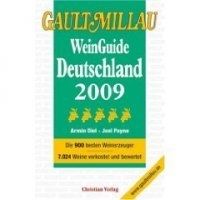Top German producers declare war

In an extraordinary development, the 14 top German wine producers listed below have, in a letter, ‘declared war’ on Christian Verlag, publisher of the Gault Millau annual German wine guide compiled by Joel Payne and Armin Diel, pictured below. The producers want nothing whatever to do with the next edition, declaring they do not even want to be mentioned in it. The principal explicit reason for this unusual move is the producers’ exasperation at being expected to pay a ‘voluntary’ €200 to the publisher as well as being expected to supply tasting samples. 
Weingut Knipser (Pfalz)
Helmut Dönnhoff (Nahe)
Egon Müller (Saar)
Meyer-Näkel (Ahr)
Fürst (Franken)
Philippi (Pfalz)
Heger (Baden)
Weingüter Bercher (Baden)
Gunderloch (Rheinhessen)
Heymann-Löwenstein (Mosel)
Johner (Baden)
Künstler (Rheingau)
Leitz (Rheingau)
Seeger (Baden).
These crème de la crème producers declare that they will refuse to participate in the guide’s tastings even if the €200 fee is waived. Writing on Die Welt’s website yesterday, Martin S Lambeck claims that relations between some German wine producers and the Gault Millau guide’s authors Joel Payne (until last year editor of Meininger’s Wine Business International) and Armin Diel (owner of Nahe wine producer Schlossgut Diel) have been strained for some time. Lambeck expects more German wine producers to join the ranks of those who have already declared war on the guide, which takes its name from the influential French restaurant guide founded by Henri Gault and Christian Millau. .
When the reviewed go into battle with reviewers it is usually because they believe they or their wares have been underestimated by the reviewer or the guide. But in this instance that is very far from the case. All of the producers listed above are regularly garlanded with praise in the Gault Millau Guide. Knipser was even nominated Payne and Diel’s producer of the year in the most recent edition.
A substantial number of Germany's top wine producers are also rumoured to have made their mandatory contributions to the official generic organisation, the Deutsches Weininstitut conditional, effectively preventing the Weininstitut from spending their money. The organisation may well run out of funds before this action can be settled in court. This could be a good time for Riesling lovers to learn German.
See I read the news today... thread in members' forum.
Become a member to view this article and thousands more!
- 15,397 featured articles
- 274,679 wine reviews
- Maps from The World Atlas of Wine, 8th edition (RRP £50)
- The Oxford Companion to Wine, 5th edition (RRP £50)
- Members’ forum
- 15,397 featured articles
- 274,679 wine reviews
- Maps from The World Atlas of Wine, 8th edition (RRP £50)
- The Oxford Companion to Wine, 5th edition (RRP £50)
- Members’ forum
- Commercial use of our Tasting Notes
